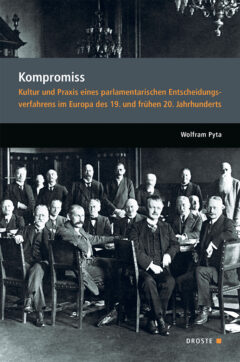Parliaments and Parliamentarianism in Europe
Parliamentarianism and parliamentarisation are the results of transnational and interdependent political transfer processes. The KGParl research focus »Parliaments and Parliamentarianism in Europe« takes this into account. It aims at expanding previous research studies of the KGParl on German parliamentarianism by including a European comparative perspective. Related to this is a topical focus on the development of parliamentary culture(s) in Europe. Comparative systematic studies are intended to analyse symbols, rituals and forms of communication of European parliaments and thus explore the potential of symbolic communication. In doing so, the research focus explicitly draws on anthropological and cultural historical questions.
A European subject with comparative perspective will only be meaningful when carried out in cooperation with European research institutes. This can be best achieved by means of international academic conferences. Thus, the KGParl has initiated the conference series »Parlamentarische Kulturen in Europa im historischen Vergleich« (»Parliamentary Cultures in Europe from a Comparative Historical Perspective«). It focuses on topics that, through the lens of comparison, are suitable for the discussion of basic issues: »Das Parlament als Kommunikationsraum« (»Parliament as Communication Space«), »Lebenswelten von Abgeordneten in Europa« (»Lifeworlds of Parliamentarians in Europe«), »Das ideale Parlament« (»Ideal Parliament«) as well as »Antiparlamentarismus und Parlamentarismuskritik« (»Anti-Parliamentarianism and Criticism of Parliamentarianism«).
Kompromiss. Kultur und Praxis eines parlamentarischen Entscheidungsverfahrens im Europa des 19. und frühen 20. Jahrhunderts / Compromise. The culture and practice of a parliamentary decision-making process in 19th and early 20th century Europe
Compromise as a regulated procedure between actors authorised to make decisions is a sought-after commodity in everyday political life. It is therefore surprising that there are no comparative treatises on the genesis of this decision-making procedure.
This volume provides an introduction to the research field of a comparative European history of compromise since the mid-19th century. It analyses complex negotiation systems in seven European states that were institutionally oriented towards compromise. The interdisciplinary nature of the cross-sectional topic of ‘compromise’ is realised through contributions from sociology, political science and political linguistics. Overall, the volume sharpens our awareness of the fact that compromise required a specific culture of negotiation, which flourished above all in parliamentary representative bodies. Parliamentary compromises were always available when the political language worked towards the compromise and was able to put it into practice.
The research project builds on the assumption that similarities inherent to parliamentarianism can be identified even beyond constitutional and political historical dimensions, and that those similarities can ultimately explain political and cultural processes. The assumption of a common parliamentary tradition, on the other hand, faces challenges and questions. In other words, the project must take into account differences as well as their causes and repercussions. Particularly noteworthy in this respect is the frequently suggested exemplary function of the English Parliament as the »mother of parliaments« as well as French parliamentarianism as the cradle of the separation of powers.
In this context, the KGParl is particularly committed not only to focus on the better researched Western European parliaments but also to include those of the nation states in Eastern Central Europe and explore their history as multiethnic nations of the nineteenth century.


